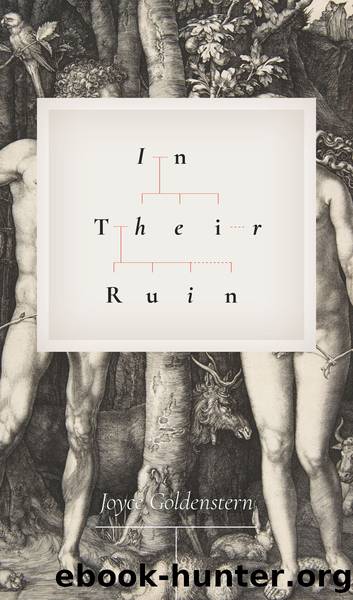In Their Ruin by Joyce Goldenstern

Author:Joyce Goldenstern
Language: eng
Format: epub
Publisher: Black Heron Press
Published: 2024-10-15T00:00:00+00:00
Marisol
Caleb handed Marisol a colorful crayon drawing. Without having to ask, Marisol knew that the little boy in the drawing was Caleb and the tall man at his side, dressed in harlequin, was his father Samuel. Marisol thought about Samuel more than she really wanted to. She did not pine for him or hate him or regret her decision to leave her life in Chicago, but she, of course, lived with his child and saw on the childâs face Samuelâs resemblance and read into the childâs gestures and preferences echoes of Samuelâs gestures and preferences or notable departures from them.
Celia, Marisolâs aunt, no longer pretended that she was Calebâs mother. Still, Celia continued to be helpful and reliableâcooking, babysitting, attending school eventsâwhile her niece took college courses, worked late at the newspaper, or volunteered for one cause or another. Marisol had established herself in the community as eccentric, but a fighter for justice and a champion for Latina causes, including domestic violence, so the need to offer explanations about a child without a father or to pretend to be ârespectableâ in a conventional sense seemed less important. Marisol had done favors for many neighbors and counted on their goodwill.
Aunt Celia shared some of her worries about Caleb with Marisolâhis preferences of clothes colors, orange, pink, red, turquoiseâwere these colors a boy should like?âthe reports from teachers that Caleb had problems reading, that he spent too much time alone practicing dance steps or manically fixing the forever broken pencil sharpener, that he once was found trying on a little girlâs bracelet and had adamantly insisted that it was his own.
Marisol dismissed these concerns as trivial compared with the injustices in the world, though sometimes she worried her son did not have the self-esteem and grit he might need to be a spy for Aztlan, her long ago wish when she named him after a Biblical spy. She still hoped he would follow in her footsteps and fall in love with great causes as she had done when she read Rodolpho Acuñaâs Occupied America when she was in high school and had been able to suddenly contextualize her shameâlonely afternoons at the race track, the only child there watching her father walk and groom the horses and she being asked, Do you speak English? Where is your mother? Why arenât you in school? And then later lonely afternoons in the apartment after school on the steps reading, overhearing neighborhood children, âSheâs pretty, but sheâs a Mexican.â âI heard her mother died swimming across a river.â âI heard her father cheats at cards.â
Acuñaâs book had banished shame and boosted confidence. She assumed her proper role as an indignant native whose homeland had been invaded, no longer an outsider but an insider with justifiable grievances. In grammar school, a stance of haughty silence protected her against the ignorance that surrounded her in Cicero. But armed with Acuñaâs book, she emerged a poised and verbose crusader. She still had her original copy of the book, underlined and dog eared.
Download
This site does not store any files on its server. We only index and link to content provided by other sites. Please contact the content providers to delete copyright contents if any and email us, we'll remove relevant links or contents immediately.
In Control (The City Series) by Crystal Serowka(36228)
The Wolf Sea (The Oathsworn Series, Book 2) by Low Robert(35249)
We Ride Upon Sticks by Quan Barry(34539)
Crowbone (The Oathsworn Series, Book 5) by Low Robert(33623)
The Book of Dreams (Saxon Series) by Severin Tim(33386)
The Daughters of Foxcote Manor by Eve Chase(23628)
Trainspotting by Irvine Welsh(21666)
Call Me by Your Name by André Aciman(20516)
The Secret History by Donna Tartt(19088)
Shot Through The Heart (Supernature Book 1) by Edwin James(18926)
All the Missing Girls by Megan Miranda(16028)
American King (New Camelot #3) by Sierra Simone(15891)
The Girl from the Opera House by Nancy Carson(15785)
Pimp by Iceberg Slim(14508)
Sad Girls by Lang Leav(14423)
The Betrayed by Graham Heather(12832)
The Betrayed by David Hosp(12792)
4 3 2 1: A Novel by Paul Auster(12392)
Still Me by Jojo Moyes(11266)
